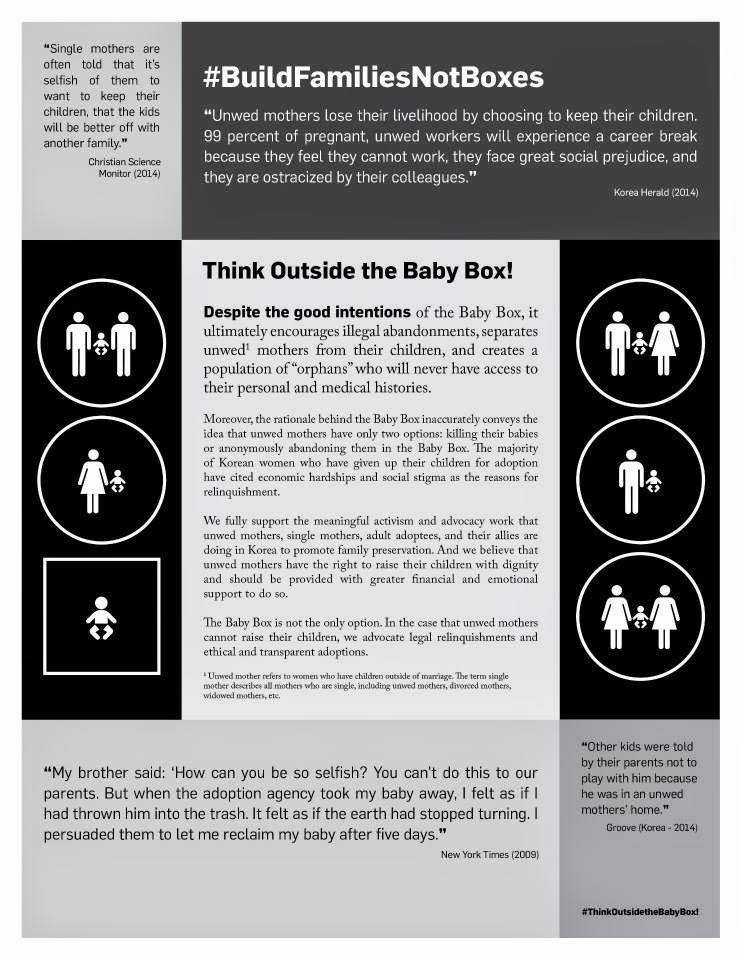After the screening of the South Korean documentary “the
Baby Box” (official webpage: click here), recently
social-media
posts
about the controversial phenomenon have been resurfacing on the internet stirring up commotion and strong
anti-activism. Apparently, there's a considerable amount of people (e.g. the #ThinkOutsideTheBabyBox movement) who are very much
against the existence of the hatch where presumably(!) mothers can anonymously give away their unwanted baby.
Note: due to the anonymous character, it is hard to know who exactly makes use of the baby box, but one can assume that most likely and therefore 'presumably' parents do (and likelier mothers).
Note: due to the anonymous character, it is hard to know who exactly makes use of the baby box, but one can assume that most likely and therefore 'presumably' parents do (and likelier mothers).
 |
| Source: https://www.facebook.com/events/478940685586548/ |
 |
| Source: https://www.facebook.com/events/478940685586548/ |
"The Baby Box (Drop Box)":
"The Drop Box [Full Story] (Korean, Eng subs):
For those who have met my obsessive character already,
I couldn't help but wanting to know all about it and ask everyone's opinion on this topic. So, I did
a little research in order to understand this heart-wrenching phenomenon better.
After a few clicks on the world wide web, I found it quite interesting to see that in many countries the baby boxes are neither legal nor illegal, meaning that it's illegal but commonly not punished by the law, or it finds itself somewhere in a grey zone. What I was wondering was... if you consider baby boxes and adoption, how much do they differ in essence and why is adoption less controversial than the baby box? To me ethically, it doesn't differ that much. In both cases the parents (presumably) have rendered themselves incapable of taking care of their own child. What's questionable for me is promoting the baby box and adoption as the better option, because it simply isn't. Moreover, it is just one choice, usually the last one since parents will contemplate and only choose the best available option. In some countries there are more options and less stigmatizing, while in others there are less options and more stigma. I consider Belgium as the former and Korea as the latter. This could explain why in Korea there are a lot more children brought to the baby box than in Belgium.
For being an illegality, the one in Belgium has quite an official website:
The organization is a non-profit and
non-religious one called "Mothers for Mothers". The reason for them
offering the baby box stated: "We want to offer desperate mothers the
chance to anonymously give their baby a warm and safe home." Babies get a
name and also official documents, they then go to a foster family after one
month, then the family can adopt the baby after 6 months. The biological mother
(presumably) can take a special envelope at the baby box and reclaim her baby
within six months. They also have a emergency help line mothers can call to anonymously. So, even though the person who brings the baby to the baby box is by Belgian law an offender, there is some sort of legal framework for it, since the baby can get official documents.
Amid all the commotion, I agree with critics that a baby box is not
the healthiest option. Still, in Belgium (and also in Korea) it seems better than
leaving your baby alone in
a desolate place, which is reported to have happened before, since those babies usually
don't survive. The difference with adoption is that it happens completely anonymously, but still
the baby is often reported in the news with its new name. So the mother knows the baby's new
name (!), which to me is rather
something doubtful and controversial.
I can also agree with the critics that support for desperate,
single mothers and parents should be raised so they wouldn't have to resort to
choices like abandoning their baby or bringing it to the baby box. However, in the end, I believe,
when it comes to babies, it's still one's personal choice and responsibility,
regardless of the motivations. And the choice of baby box or giving a baby up for adoption is
never an easy one. I feel a lot of people have an opinion about the baby box as strong criticism
is easy to vent, but what matters is still a life of a young and innocent human
being that has the right to live. As long as there will be no direct solutions
it’s still better to do what’s necessary to save a life that might have been
already discarded regardless of economic and psychological support offered by
governments. Alongside constructive and long term solutions, the baby box could
be a humane and valuable solution, but only if it is integrated into a legal
framework providing the best intentions for both parties involved. What is your opinion?
If only now some genius would invent a box to abandon my concentration problems... or a Graduation Time Machine?! ;)
If only now some genius would invent a box to abandon my concentration problems... or a Graduation Time Machine?! ;)
Geen opmerkingen:
Een reactie posten